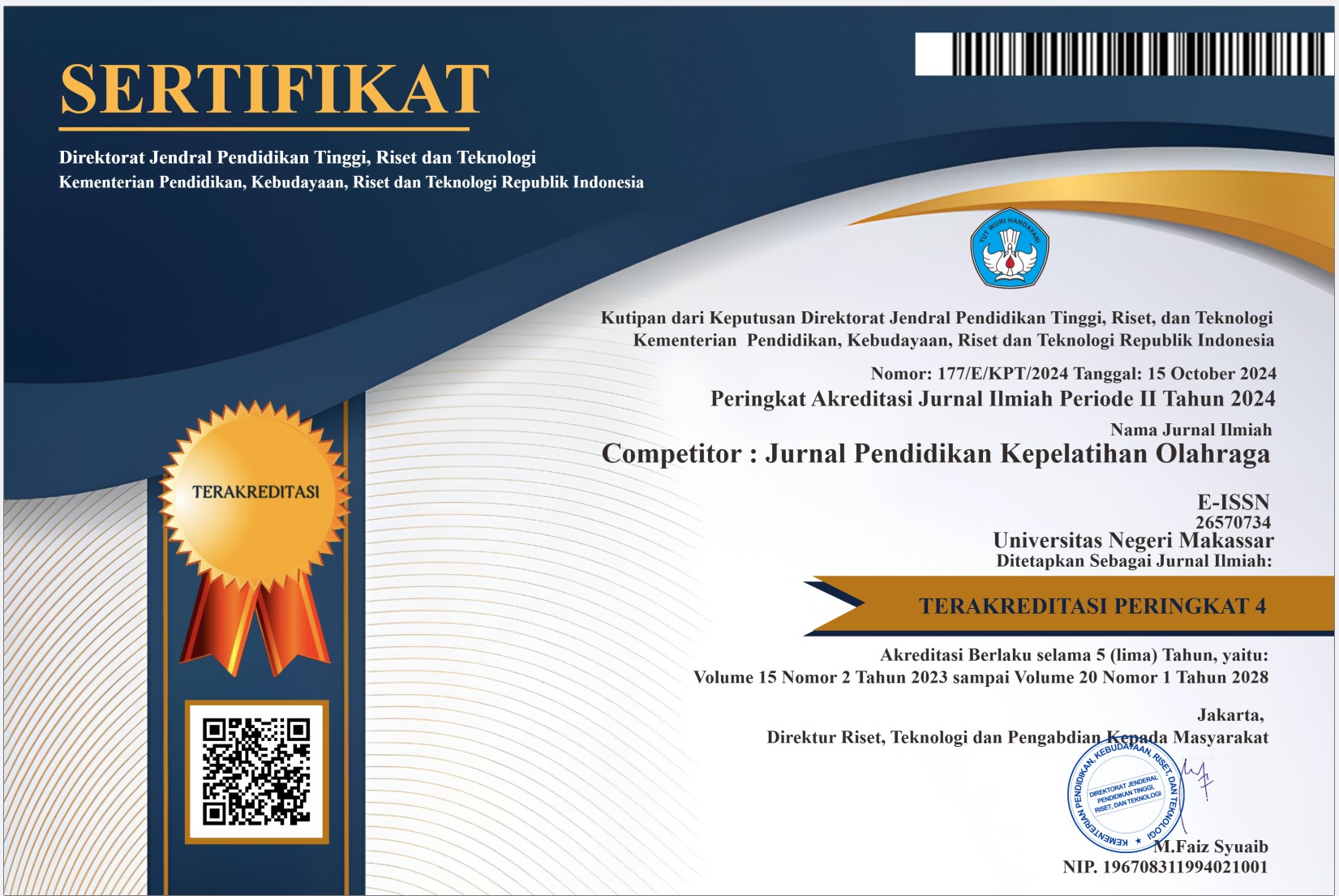Experimental Study of the Effect of Core Stability Training on Body Stability when Performing Gyaku Tsuki on FIKK UNM Students
DOI:
https://doi.org/10.26858/cjpko.v17i1.74412Keywords:
Core Stability Training, Karate, Body Balance, Motor Control, Gyaku Tsuki.Abstract
This study aimed to investigate the effect of an eight-week core stability training (CST) program on body stability during the execution of gyaku tsuki among students of the Faculty of Sports Science and Health (FIKK), Universitas Negeri Makassar. Thirty participants were randomly assigned to either an experimental group (n = 15), which underwent CST, or a control group (n = 15), which did not receive any specialized intervention. The training was conducted three times per week for 45–60 minutes, incorporating both static (plank, side plank, bird dog) and dynamic (medicine ball twist, TRX knee tucks, Swiss-ball jackknife) exercises. Body stability was assessed using motion analysis, focusing on trunk control and centre of mass deviations. The experimental group demonstrated a significant improvement from the pre-test (M = 72.40, SD = 4.25) to the post-test (M = 81.33, SD = 3.89), with a paired sample t-test result of p < 0.001. In contrast, the control group showed no significant difference (p = 0.078). An independent t-test comparing post-test scores between groups showed a significant difference (p < 0.001), with a very large effect size (Cohen’s d = 2.20). The findings confirm that CST is an effective method to enhance body stability during gyaku tsuki performance. This supports its integration into karate training programs to improve athletic performance and movement efficiency.References
Akuthota, V., Ferreiro, A., Moore, T., & Fredericson, M. (2019). Core stability exercise principles. Current Sports Medicine Reports, 18(1), 39–45. https://doi.org/10.1249/JSR.0000000000000556
Behm, D. G., Drinkwater, E. J., Willardson, J. M., & Cowley, P. M. (2021). The use of instability to train the core musculature. Strength and Conditioning Journal, 43(3), 63–76. https://doi.org/10.1519/SSC.0000000000000586
Borghuis, J., Hof, A. L., & Lemmink, K. A. (2023). The importance of clinical criteria and sample selection in sports intervention research. Journal of Sports Sciences, 41(2), 151–159. https://doi.org/10.1080/02640414.2022.2134567
Chaabene, H., Negra, Y., Moran, J., et al. (2021). Strength, power, and agility training in combat sports. Sports Medicine, 51(4), 561–580. https://doi.org/10.1007/s40279-020-01373-5
Choi, Y. J., Park, J. H., & Kim, J. H. (2021). Core training effects in young martial artists. International Journal of Environmental Research and Public Health, 18(9), 4571.
Clemente, F. M., et al. (2021). Effects of Core Training in Physical Fitness of Youth Karate Athletes. Int J Environ Res Public Health
Creswell, J. W., & Creswell, J. D. (2018). Research Design: Qualitative, Quantitative, and Mixed Methods Approaches (5th ed.). SAGE Publications.
Fong, S. S., & Ng, G. Y. (2020). Teaching martial arts in universities: A strategic approach. Asian Journal of Physical Education, 12(2), 102–117.
Granacher, U., Lesinski, M., Büsch, D., et al. (2019). Effects of resistance training in youth athletes. International Journal of Sports Medicine, 40(10), 623–632.
Hussein, A., Al-Yami, M., & Omar, F. (2020). The effects of core training on postural control in taekwondo. Journal of Human Kinetics, 75, 119–128.
Imai, A., Kaneoka, K., & Okada, T. (2021). Trunk function and athletic performance. Journal of Biomechanics, 123, 110527.
Kibele, A., & Behm, D. G. (2019). Seven principles of core stability. Journal of Sport Rehabilitation, 28(2), 123–131.
Kibler, W. B., Press, J., & Sciascia, A. (2018). The role of core stability in athletic function. Sports Medicine, 38(3), 189–198.
Lakens, D. (2022). Sample size justification. Collabra: Psychology, 8(1), 33267. https://doi.org/10.1525/collabra.33267
Lee, J., & McGill, S. (2017). The role of the core in martial arts striking techniques. Journal of Strength and Conditioning Research, 31(3), 659–666.
Loturco, I., Artioli, G. G., & Kobal, R. (2020). Performance prediction in combat sports. Sports, 8(5), 68.
Muyor, J. M., Alacid, F., & Lopez-Minarro, P. A. (2022). Effects of core training on anticipatory postural adjustments. Journal of Human Sport and Exercise, 17(3), 412–423.
Rahimi, M., et al. (2023). Impact of Core Stability Trainings on Functional Movement Screening … J Clin Res Paramed Sc
Guan, L. et al. (2024). Effects of Core Muscle Stability on Kicking Performance in Taekwondo. Journal of Men’s Health
“Relationship between core system, strike strength and strike speed …” (2025)
Lakens, D. (2022). Sample size justification. Collabra: Psychology, 8(1), 33267. https://doi.org/10.1525/collabra.33267
Lesmana, K. Y. P., et al. (2022). Gyaku‑Tsuki Punch Technique Training … International Journal Health Sciences
Liew, X. R., Lim, Y. C., & Tan, C. W. (2022). Motion capture technologies in combat sports: Accuracy, validity, and applications. Journal of Sports Biomechanics, 41(4), 578–587. https://doi.org/10.1080/14763141.2022.2030451
Pereira, L. A., Freitas, T. T., Pivetti, B., & Loturco, I. (2021). The role of reliability and data consistency in sports science testing. Sports Biomechanics, 20(6), 857–867. https://doi.org/10.1080/14763141.2020.1725102
Thomas, J. R., Nelson, J. K., & Silverman, S. J. (2020). Research Methods in Physical Activity (8th ed.). Human Kinetics.
Willardson, J. M., & Burkett, L. N. (2018). The role of trunk training in athletic performance. Strength & Conditioning Journal, 40(1), 58–66.
Downloads
Published
Issue
Section
License
Copyright (c) 2025 Sudirman Sudirman (Author)

This work is licensed under a Creative Commons Attribution 4.0 International License.



















